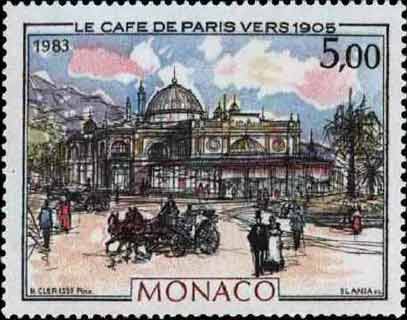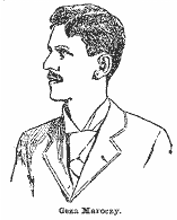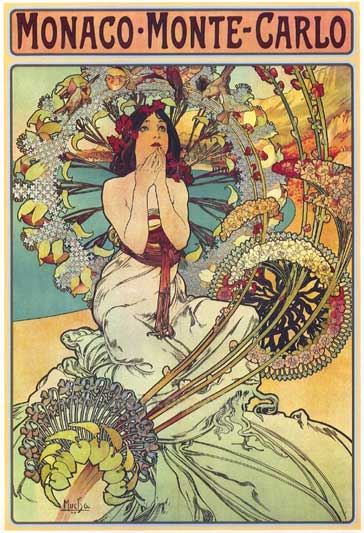|
The 1902 International Chess Tournament of Monte Carlo

Brooklyn Eagle, March 10, 1902
The drawing for the twentieth and semi-final round of the international
chess masters' tournament here, this morning, resulted in the selection of
the less exciting of the two remaining pairings, the seventh of the Berger
schedule.
While it included several very important encounters, Maroczy and
Pillsbury, the leaders, were matched with the weaker of their opponents,
and consequently the real tussle is left for the final round to-morrow.
Pillsbury was the first to bring his game to a conclusion. Mortimer, the
tail-ender, succumbing to a vigorous counter attack.
Temporarily the lead was then with the American champion, but he did not
enjoy it for long.
Maroczy's victory over Popiel followed, in due course, the latter being
outplayed at all points.
The Hungarian thereupon again passed Pillsbury and still holds a lead of
point over the American.
It is possible for Pillsbury to pass his rival by defeating Marshall in hi
last game to-morrow, in case Maroczy should fall victim to Tarrasch.
The only other player who can equal Maroczy's present total, in the event
of the latter's defeat, is Teichmann, and to do so he must win from
Tarrasch to-day and from Janowski to-morrow.
All the other competitors have been distanced as far as first prize is
concerned. Marshall is doing his utmost to gain an advantage with Janowski. Thus far
his efforts have been to no purpose.
The Teichmann-Tarrasch contest has been closely fought and will probably
result in a draw.
Brooklyn Eagle, March 11, 1902
Pillsbury and Marshall engaged in a rough and tumble encounter with plenty
of complications in the final round of the international chess masters'
tournament at Monte Carlo this morning.
The American champion was on his mettle, and, with keen insight,
anticipated Marshall's every move, and thwarted his designs.
Eventually, getting the upper hand, Pillsbury emerged winner of a well
fought game.
Several things were determined by the result of this encounter. Chief was
the fact that Pillsbury cannot be headed off by any of the competitors for
second place and that Teichmann no longer can attain to an equality for
first prize.
In case Pillsbury winds up in the lead, by virtue of Maroczy's possible
defeat by Tarrasch, the Teichmann may tie the Hungarian for second.
Nevertheless, the question of who will actually receive the different
prizes is still an open one, even at this late hour. The first four,
however, will go to Pillsbury, Maroczy, Teichmann and Janowski.
|
GEZA
MAROCZY FIRST AT MONTE CARLO
_______________
Hungarian Chess Champion Wins
International Tournament
Pillsbury Second
_________________
MARSHALL IS NOT PLACED
Janowski and Teichmann Third and Fourth
Tarrasch, Schlechter and Wolf also Winners.
_________________
(special to the Eagle)
Monte Carlo, Monaco, March 12 -- The international chess masters'
tournament, which has been in progress here since February 3, came
to a conclusion this morning.
Geza Maroczy of Budapest, certain of at least tying for first prize,
succeeded in drawing the second time with Tarrasch, and emerged, in
accordance with general expectations, winner of chief honors.
Harry N. Pillsbury, the American champion, is left in second place
by the smallest possible margin - a quarter of a point.
While yesterday's play in the final round was attended by the
greatest excitement, suppressed though it was, this morning's was of
very perfunctory character.
The question of supremacy was practically settled in the minds of
nearly all, when Maroczy, as second player, managed to draw with
Tarrasch of Germany, and tied Pillsbury's total of wins.
Having the move to-day, it was taken for granted that Maroczy could
do no worse than draw again, which was all that was necessary for
him to gain that all important quarter of a point.
Subsequent events proved that the surmise was correct, for Tarrasch,
being on a level with Schlechter and Wolf, and just within range of
the minor prizes, did not feel called upon to risk finishing as a
non-prize winner.
Maroczy, on the other hand, needed only to play for safety.
Accordingly, the game was not particularly entertaining and a draw
was ere long agreed upon.
The same state of affairs existed between Schlechter and Wolf, who
were paired in a supplementary contest. Both wished to figure as
prize winners and took no chances whatever.
The result was that Schlechter, Wolf and Tarrasch all tied for
fifth, sixth and seventh prizes. The management, in view of the
large amount of consolation money, contributed by outsiders, decided
to add a seventh prize and increase the regular prize fund by 750
francs.
Otherwise the chief winners of the consolation money would have
received almost as much as the lower prize takers.
The third and fourth prizes had been definitely determined yesterday
afternoon when Janowski downed Teichmann and passed him for third
place. The official list of winners is as follows:
First prize, 5,000 francs, Geza Maroczy, Hungary.
Second prize, 3,000 francs, H. N. Pillsbury, America.
Third prize, 2,000 francs, D. Janowski, France.
Fourth prize, 1,500 francs, R. Teichmann, England.
Fifth, sixth and seventh prizes, 1,000, 750 and 500 francs equally
divided between Dr. S. Tarrasch, Germany; C. Schlechter, Austria and
S. Wolf, Austria (750 francs apiece).
The consolation money was divided according to the merit of the
final scores of the non-prize winners.
The special prizes for brilliancy, etc. will be awarded later on.
|
A point of particular interest is the fact that the two chief prize
winners, Maroczy and Pillsbury, were absent from the first
tournament, held here last year, when Janowski of Paris finished in
first place.
On this
season Janowski finished just below the two absentees of a year ago.
There were in all six supplementary games to be played off this
morning and every one of these, like those already referred to, were
drawn.
Napier divided the score a second time with Marco and the young
American accordingly wound up his schedule as leader of the second
division of masters.
Marshall of Brooklyn, on the other hand, after a brilliant start,
finished ninth, below Tschigorin of Russia and above Gunsberg, who
brought up the rear of the first division of ten players.
Other drawn games this morning were recorded between Mason and
Eisenberg, Popiel and Gunsberg and Scheve and Eisenberg. None of
these affected the standing of the respective players. The final
records show:
Maroczy.............
Pillsbury.............
Janowski............
Teichmann.........
Schlechter..........
Tarrasch.............
Wolf....................
Tschigorin..........
Marshall.............
Gunsberg............ |
14¾
14½
14
13¼
12
12
12
11½
11
10¾ |
4¼
4½
5
5¾
7
7
7
7½
8
8¼ |
Napier...............
Mieses..............
Mason..............
Albin.................
Marco...............
Popiel................
Scheve..............
Eisenberg.........
Reggio..............
Mortimer.......... |
9½
9¼
9
8½
7¾
7
5
4½
2½
1 |
9½
9¾
10
10½
11¼
11¾
14
14½
16½
18 |

Geza Maroczy was born on March 3, 1870, at Szegedin, Hungary, and
was educated at the Polytechnic School of Zurich, where he became
librarian of the Hungarian Society. Here he first learned chess.
Later he was appointed to a government position at Budapest and he
is now a civil engineer.
Maroczy's first appearance of note was at Hastings in 1895, where he
won first prize in the minor competition, concurrent with the
international tournament won by Pillsbury.
Next year, at Nuremberg, he made his debut in an international
masters' tournament and created a sensation by finishing second to
Lasker, and above Pillsbury and Tarrasch.
The same year he took part in an international tournament at
Budapest, but was not placed. He did not play in the Berlin contest
of 1897 but in the Vienna congress of 1898, he divided eighth and
ninth prizes with Lipke.
At London in 1899, he divided third and fourth prizes with
Pillsbury, following Lasker and Janowski, while a year later, at
Paris, he divided third and fourth prizes with Marshall.
Brooklyn Eagle, March 12, 1902
|
|
Brooklyn Eagle, March 16, 1902
The wind up of the tournament, which ended last Wednesday, found G.
Maroczy of Hungary in the van, with the American champion,
Pillsbury, a quarter of a point in his wake. Janowski, the previous
winner, was this time third in a field of twenty, a place he
attained by defeating Teichmann in the final round.
Teichmann's grand work was the prominent feature of the contest and
there was universal regret when, on the last day, he succumbed to
Janowski, being relegated thereby to fourth place. This was not due
to any lack of popularity on the part of Janowski, but because
Teichmann had earned his position by persistent and conscientious
application to a more difficult task than fell to the lot of any of
his rivals. He drew with seven of the players, and, of course, had
that many additional contests to play. Four of these supplementary
contests he drew a second time, but the other three he won.
Tarrasch and Schlechter started poorly, especially so the former,
but, as was expected, made a strong finish. Wolf of Vienna, who tied
with these two, was a distinct surprise. He is evidently to be heard
from in the future.
Tschigorin made a determined bid for a high rank, but was left at
the post.
Marshall's brilliant start was in marked contrast to his indifferent
work at the close. Nevertheless, he has strengthened his reputation
materially, and is now considered one of the most dangerous
opponents among the world's leading masters.
Napier, on the other hand, finished in good form, and his position
at the head of the second division is a source of gratification to
his friends. It must be said that his international debut was a
decided success.
The replaying of drawn games has again been found to be
unsatisfactory and a burden, particularly to the weaker competitors.
In reviewing the play it is worth while to note how the leaders
would have stood had the drawn games been counted in the old
fashioned way. Pillsbury and Wolf were not affected by the rule, as
each won and lost two games in the play off. Tschigorin and Marshall
each won one and lost one, Teichmann won three, Janowski, Tarrasch
and Schlechter each two, and Maroczy one. None of these five players
lost a supplementary game. Consequently, had the original drawn
games been counted as ½, Maroczy and Pillsbury would have tied for
first and second, Janowski and Teichmann would still have third and
fourth, respectively; Wolf would have finished fifth, while
Tschigorin would have tied with Tarrasch and Schlechter for sixth
and seventh.
In this connection the record of chief prize winners in all
international tournaments they have competed in, will be of interest
to every chess player. The tables giving this information follow:
Maroczy's Record.
| Year |
Place |
Rank |
Pl'd |
Won |
Lost |
1896
1896
1898
1899
1900
1900
1902 |
Nuremberg*
Budapest
Vienna*
London*
Paris*
Munich*
MonteCarlo* |
2
9
8
2
3
3
1 |
18
12
37
27
16
15
19 |
12½
5
30½
18
12
12
14¾ |
5½
7
16½
9
4
3
4¼ |
*Prize winner
At Budapest Maroczy tied with Albin; at Vienna with Lipke; at London
with Pillsbury. and Maroczy, at Paris, with Marshall, at Munich with
Pillsbury and Schlechter for first place, but retired from the play
off.
|
PILLSBURY'S RECORD
| Year |
Place |
Rank |
Pl'd |
Won |
Lost |
1895
1895
1896
1896
1898
1899
1900
1900
1902 |
Hastings
St.Petersberg
Nuremberg*
Budapest
Vienna †
London ‡
Paris
Munich §
Monte Carlo |
1
3
3
3
2
2
2
1
2 |
21
18
18
12
37
27
16
15
19 |
16½
8
12
7½
28
18
12½
12
14½ |
4½
10
6
4½
8½
9
3½
3
4½ |
*Tied with Tarrasch. †Tied with Tarrasch and lost
in the play off. ‡Tied with Maroczy and Janowski. §Tied with
Schlechter, both in the tournament proper and in the play off.
Maroczy also tied for first, but dropped out of the play off, taking
third prize.
JANOWSKI'S RECORD
| Year |
Place |
Rank |
Pl'd |
Won |
Lost |
1894
1895
1896
1896
1897
1898
1898
1899
190
1900
1901
1902 |
Leipsic*
Hastings
Nuremberg*
Budapest*
Berlin*
Vienna*
Cologne
London*
Paris
Munich*
MonteCarlo*
MonteCarlo* |
5
12
5
4
4
3
9
3
10
7
1
3 |
17
21
18
12
19
37
15
27
16
15
18
19 |
10½
9½
11½
7
12½
26½
7½
18
9
7½
10½
14 |
6½
12½
6½
5
6½
10½
7½
9
7
7½
2½
5 |
*Prize winner
In 1894 Janowski tied with Marco; in 1895 with Burn and Mason; at
Budapest, with Schlechter; at London with Pillsbury
and Maroczy; at Paris with Showalter and at Munich
with Berger, Showalter and Wolf.
TEICHMANN'S RECORD
| Year |
Place |
Rank |
Pl'd |
Won |
Lost |
1894
1895
1896
1897
1899
1902 |
Leipsic*
Hastings*
Nuremberg
Berlin
London
MonteCarlo* |
3
7
19
16
15
4 |
17
21
18
19
14
19 |
12
11½
4
7½
2
13¼ |
5
9½
14
11½
12
5¾ |
*Prize winner
At Hastings Teichmann tied with Bardelben. At London he retired
after playing a few games in the first round, the rest being
charged to him as loses.
By a perusal of the foregoing tables it will be readily seen that
Pillsbury's record surpasses all the others. He was a prize
winner wherever he competed and his poorest effort was to tie
for third place. His is second only to that of Lasker, whose
record will be found in the following list of tournament
winners since 1895, when Pillsbury made his debut:
| Year |
Place and Winner |
Won |
Lost |
1895
1895
1896
1896
1897
1898
1898
1899
1900
1900
1901
1902 |
Hastings, Pillsbury
St.Petersberg, Lasker
Nuremberg, Lasker
Budapest, Tschigorin
Berlin,
Charousek
Vienna, Tarrasch
Cologne, Burn
London, Lasker
Paris, Lasker
Munich,.Pillsbury,.Schlechter
Monte
Carlo, Janowski
Monte Carlo, Maroczy |
16½
11½
13½
8½
14½
28½
11½
22½
14½
12
10¼
14¾ |
4½
6½
4½
1½
4½
8½
4½
4½
1½
3
2¾
4¼ |
Lasker won every tournament he
competed in, except Hastings where he finished third
after Pillsbury and Tschigorin. |
click here for the
Crosstable
William Ewart Napier won the Rothschild Brilliancy Prize for
this game against Tschigorin: |
|
"Prince Dadian of Mingrelia's special prize for the
most brilliant game played in the Monte Carlo tournament has been
awarded to James Mason of London for his victory over D. Janowski, the
French champion. This encounter ran as follows:" |
|

|

